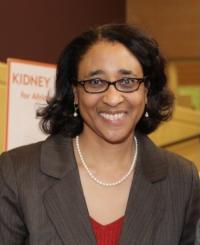
Faculty spotlight: Dr. Bessie Young
Dr. Young is a professor of medicine in the Division of Nephrology and holds adjunct titles in the Departments of Epidemiology and Health Services. She received her MD in 1987 and her MPH in 2001, both from the University of Washington.
Her research focuses on racial disparities and genetic factors predicting outcomes of patients with kidney disease, education regarding access to transplantation and dialysis for minorities, and access to kidney disease care in rural areas.
She also is committed to diversity efforts in the department, school, University, and on local, regional and national levels. She is an active member of our Diversity Council, which is chaired by Dr. Rudy Rodriguez.
Young Endowed Scholarship
In 2010, the Young Endowed Scholarship was established in her name. As the only African American woman in her entering medical school class, she understands the difficulties faced by medical students who come from diverse backgrounds. She and her husband, Dr. Marco Mielcarek, created the scholarship to support students from economically disadvantaged backgrounds, students who are the first in their family to go to college, candidates with deep experience with diversity, or individuals who have overcome personal or educational obstacles to attend the UW School of Medicine.
In July 2015, Dr. Young was promoted to full professor in the Department of Medicine, making her our first African American female professor.
“Diversity is an important issue at the University of Washington with regards to patient care, teaching, and research. The UW continues to make strides to increase diversity across all departments within the school of medicine, ranging from medical students, residents and fellows, to academic faculty. Hopefully my promotion will serve to increase awareness of diversity issues throughout the UW academic community and serve as catalyst to move these issues forward for junior faculty in the pipeline.”
-Dr. Bessie Young
Her research
Minorities and chronic kidney diseases
Young’s research focuses primarily on chronic kidney disease (CKD), diabetes complications and comorbidities, and health disparities in minority populations with CKD.
She has an impressive record of identifying previously undiscovered disparities between white and minority populations with CKD. She was the first to identify a greater prevalence and incidence of diabetic nephropathy and greater risk of amputations in minority populations than in white populations, conversely finding that minorities tend to have less cardiovascular disease and a greater chance of survival than white populations on dialysis when access to care is comparable.
Young has also been a pioneer in discovering an association between CKD and depression, finding a higher rate of death in depressed diabetic patients with late-stage CKD than in patients with the same condition that were not depressed.
One of her more recent publications in the New England Journal of Medicine showed that a collaborative approach to care for patients with comorbid chronic illnesses and depression decreased blood pressure, lipids, hemoglobin A1c and depression.
Jackson Heart Study
Young has brought together a working group composed of national experts on CKD epidemiological research and biostatistics through the Jackson Heart Study. This working group, which includes prominent researchers in Nephrology and Biostatistics through the Kidney Research Institute, aims to refine research priorities in evaluating risk factors for CKD in African American populations, as well as to evaluate the interaction of CKD and cardiovascular disease in African Americans.
This Jackson Heart Study project is an important next step in advancing the nephrological and cardiovascular wellness of African Americans.
Ethics of genetic testing for kidney disease in African Americans
Dr. Young, Dr. Wylie Burke, and co-investigators at the Kidney Research Institute have received a $2.1 million NIH multi-center grant entitled “Community-Based Evaluation of Apolipoprotein 1 (APOL1) Genetic Testing in African Americans” that will evaluate community, research, and provider views concerning the risks and benefits to providing APOL1, a new polymorphism associated with end-stage renal disease, genetic testing information to patients and family members who may be at risk for kidney disease.
Veterans Affairs Specialty Care Access Network
As a principal investigator on two VA grants, she aims to use telemedicine to address issues of rural access to specialists and advanced care for complex chronic diseases.
The first, Veterans Affairs Specialty Care Across Network-Extension for Community Health Care Outcomes (SCAN-ECHO), aims to develop a team of clinical care providers to partner with on-site primary care providers and other VA specialists to develop specialty care clinics in rural areas.
This team will include specialists in CKD, hepatitis C, congestive heart failure, advanced lung disease/COPD and HIV.
Her second VA award, through the Office of Rural Programs, will establish a CKD Renal Registry, with the charge of determining differences in CKD prevalence and progression in rural versus urban veterans, in order to facilitate establishing nephrology SCAN-ECHO programs in underserved rural areas nationally.
Patient care and teaching
In addition to her robust research program, she sees patients at the Seattle VA. Her expertise in dialysis care and care of patients with chronic and end-stage kidney disease have led to her status as a regional clinical expert. She teaches on the general medicine and nephrology inpatient consultation services and is regarded as accessible, approachable, enthusiastic, supportive, knowledgeable and a natural teacher.
"We are all very proud of Bessie. It was a pleasure to get to know her while serving as her medicine ward attending at the VA while she was an intern. It has been a continued pleasure to interact with her as her very successful career has developed. I am thrilled that she is our first African American female professor."
-Department Chair William Bremner